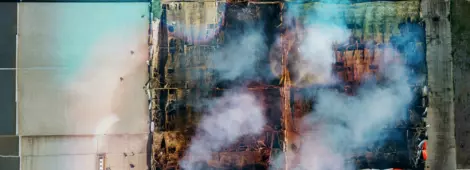
Misdeclaration of Charcoal Cargoes + Fire Risks on Shipping Vessels
by Greg Owens
In recent years, the number of reported fires on cargo vessels has increased, with over 200 reported fire incidents on shipping vessels in 2022 alone – the highest total for a decade. Sixty-four ships have been lost to fires in the past five years. Many fires reported on shipping vessels have been attributed to misdeclared dangerous goods, such as chemicals, batteries and charcoal.
Jensen Hughes has recently investigated a number of fires at sea involving charcoal cargoes. The cargoes in these particular incidents were in the form of charcoal discs or tablets, also known as hookah coals, shisha coals, hookah charcoal, shisha charcoal, nargila coal, coal discs or coal tablets. Used for heating tobacco for smoking in hookahs or “water pipes”, the tablets are typically packaged in foil tubes of around ten tablets and then packed in branded cardboard boxes.
Dangerous Goods
Charcoal is considered a self-heating substance and at risk for spontaneous combustion, which can cause a fire and result in considerable damage to a shipping vessel and its cargo. Because of this, it is listed in the International Maritime Dangerous Goods (IMDG) code, under UN 1361, with the shipping name “CARBON animal or vegetable origin”. Material falling under UN 1361 is described as:
Black material originating from organic sources. Particularly includes carbon blacks, other non-activated carbon materials and charcoal produced from materials such as bone, bamboo, coconut shell, jute and wood. Liable to heat slowly and ignite spontaneously in air. The material as offered for shipment should be cooled down to ambient temperature before packing.
In accordance with the IMDG Code, goods listed under UN 1361 fall into Class 4.2, “substances liable to spontaneous combustion” and comprise “pyrophoric substances” and “self-heating substances”. This would include shisha charcoal, which is typically made from coconut shells, fruit woods, bamboo or other hardwoods.
IMDG Special Provision 925 Exemption for Charcoal
IMDG Special Provision 925 allows charcoal cargoes to receive an exemption from being declared as dangerous goods. To be considered non-dangerous, however, the product needs to meet the criteria stated in Part 3, Chapter 3.3, of the code, as follows:
A consignment of carbon if it passes the tests for self-heating substances, as reflected in the Manual of Tests and Criteria (see 33.4.3.3), and is accompanied by a certificate from a laboratory accredited by the competent authority stating that the product to be loaded has been correctly sampled by trained staff from that laboratory and that the sample was correctly tested and has passed the test.
The test referred to above is UN Test N.4. The first stage of this test involves placing a wire mesh cube filled with the product “in its commercial form” in a test oven maintained at a temperature of 140°C for a period of 24 hours. The product passes the test if the internal temperature of the sample does not exceed the oven temperature by more than 60°C at any time during the test period and does not display any evidence of having ignited.
If the sample passes the first stage, it is deemed that the product should not be classed as a self-heating substance under Class 4.2. If it fails, it is deemed to fall under Class 4.2 and further stages of testing are required to determine the packing group.
Ensuring the Safety of Charcoal Cargoes
Carriers must be vigilant in identifying cargoes that contain charcoal, since charcoal cargoes are frequently misdeclared and can result in fires. Bills of Lading and other documents often given no indication to carriers that the cargo contains charcoal. For example, in our investigations, we have seen various descriptions, such as “tablets for water pipe”, “water pipe accessories” and “hookah accessories”, being used for cargoes of shisha/hookah charcoal, often accompanied by HS Codes that do not relate to charcoal.
An important part of IMDG Special Provision 925 is that the cargo must be “accompanied by a certificate from a laboratory accredited by the competent authority”. Carriers should ensure that such a certificate is provided for charcoal cargoes that are not declared as dangerous goods.
However, cargoes described in the above manner is often not supplied with the test certificate required to declare charcoal cargo as a non-dangerous good. Therefore, it seems that such cargo descriptions may be used deliberately to disguise the presence of charcoal and misdeclare the cargo as non-dangerous goods.
How can this issue be addressed? Precautions taken for charcoal cargoes declared as dangerous goods should also be applied to any charcoal cargoes deemed not to fall under Class 4.2, “self-heating substances”, due to the Special Provision 925 exemption. This would include protecting the container from exposure to direct sunlight and other heat sources as well as stowing the container in an accessible location for firefighting purposes in the event of fire.

Greg is a Senior Investigator with vast experience in the industry. He has been involved in approximately 300 cases since joining Jensen Hughes. This includes investigations of fires, explosions, escapes of water and escapes of oil in…












